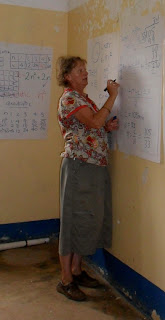A very different Christmas
As I sit typing this I can hear the girls at the Rugambwa Girls Secondary School, the boarding school across the road, in their classrooms singing Christmas songs – some in english, some in kiSwahili. It is a beautiful sound!
“But it’s Saturday” I hear you say, “and holidays, why are they in classrooms?”
Children as young as 4 are sent away to boarding school in Tanzania, often distances of several hundred kilometres from home. They often remain at school over the long holiday period either because their parents can’t afford the bus fare to bring them home or they are sponsored orphans at the school and have no other home.
There is quite a big group of girls in residence at the moment and as they often do, they have congregated to sing. Sometimes the tunes are familiar to us, sometimes they are Bantu tunes with the distinctive Bantu ululation at the end.
Yesterday afternoon we came home from Dar es Salaam after the volunteers’ conference and a holiday on Zanzibar. The house was empty of fresh food. So we went shopping this Christmas morning. It was business as usual in the market and all the shops though the bakery had not delivered any bread. (This is a Christmas bonus I reckon.) Only a very few businesses have any Christmas decorations up, and those are of the tinselly bunting variety and often accompanied by tinny carols played at double time (think Nahum Tate meets the Chipmunks!)
But at 9 am, despite the shops being open, there were people everywhere on the streets, all dressed in their best clothes, heading to or from services of worship – Lutheran and SDA mostly. The Greek Orthodox had contributed to the festivity of the day with coloured balloons along their front fence. Last night the RC Cathedral had been full for midnight mass and this evening there were again people everywhere, families out congregating and celebrating together. And not a piece of wrapping paper in sight!
We had Christmas lunch at our friend Valerie’s house with some other ex-pats and locals. It was a lovely, nearly traditional, Christmas meal. Valerie had done most of the cooking but guests also contributed to the menu including (from Matt) a cake given him by a Moslem colleague to celebrate the birth of God’s prophet!
Tonight I am listening to Handel’s Messiah and thinking about an early night – we were up very early this morning to talk to family in Australia on the phone. This morning there was no sign that Santa had visited the families of children next door. I think he missed Bukoba! The only evidence I have that Santa was active last night is from Matt – his niece in Wiltshire texted him, that she was delighted with her present from Santa, at 3 am UK time (6 am here). She had been warned not to wake her parents early and thought waking an uncle thousands of kilometres away was a safer bet!
Steve and I had our Christmas present to each other early – 6 nights on Zanzibar – but he has also given me a new pair of earrings which I will treasure! (They are Stoney tangawizi bottle caps)


























































